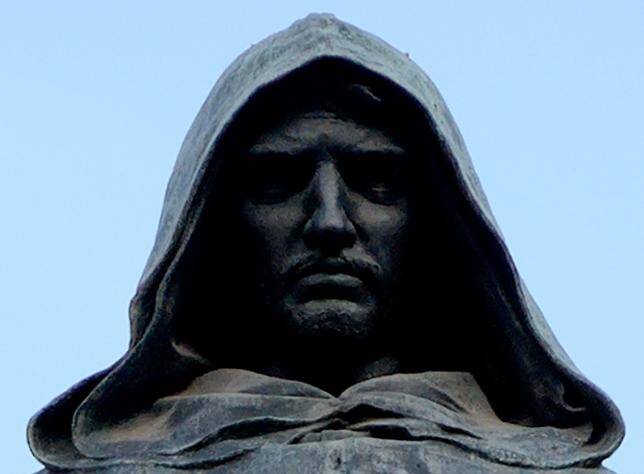His Universe Was Infinite
Every weekday, the piazza of Rome’s Campo de’ Fiori (Field of Flowers) serves as a thriving marketplace, offering a symphony of sounds and smells that have beguiled and beckoned to visitors for centuries. Contem-porary tourists are for the most part unaware that the site once served as an execution ground. If they happen to be there on a 17th of February, however, they will witness a unique, annual Roman ritual, dedicated to one of the Inquisition’s most infamous victims, who in 1600 was burned at the stake on this spot as an “impenitent, obstinate, pertinacious heretic.”
The mayor of Rome, accompanied by a contingent from City Hall, lays a laurel wreath at the bronze statue of Giordano Bruno, whose hooded and glowering countenance dominates the piazza, facing the Vatican. All through the day, groups of freethinkers, atheists, students and artists perch on or around the statue for declamatory contests, while floral pieces, poems and candles are piled high like votive offerings to a saint. Four hundred years after his death, the erstwhile Dominican friar, wandering philosopher, reformer, visionary thinker and author still challenges and invites reflection from the “generation he foresaw, here where the pyre burned,” as is engraved on the statue’s pedestal.
A contemporary of Erasmus, Shakespeare, Robert Bellarmine and Galileo, Giordano Bruno remains, like the statue erected in 1889 in his honor, a dark and shadowy figure. Ingrid Rowland’s sympathetic new biography brings to light many aspects of Bruno’s life and thought by probing the systems of literature, religion and philosophy he inhabited. Formerly a professor at the University of Chicago, now based in Rome, Rowland has published works on the Renaissance and is a frequent essayist for The New Republic. Her style is energetic and lucid, and her elegant translations of large segments of Bruno’s works inserted into every chapter add to Rowland’s lively portrait of a genius whose personality defies neat characterization or stereotyping.
As Rowland indicates, Bruno, the small man with great ideas, “could be charming or infuriating, charismatic or repellent.” Her overall portrayal is a study in those contrasts as they emerge in Bruno’s unorthodox quest for truth and peace. That unlikely journey took him from his native Nola, near Naples, to Rome, Venice, Geneva, Toulouse, Paris, London, Wittenberg and Prague. It included profession and ordination as a Dominican friar; training in Aristotelian and Platonic philosophies; dabbling in the Hebrew Kabbalah; teaching mathematics, astrology and the “art of memory” and mnemonics, for which he was justly famous.
Despite this peripatetic existence, Bruno was able to write and publish several works, often in the form of Platonic dialogues. These texts were devoted primarily to the area of natural philosophy, but they included collections of sonnets and an anthology of love poems. Rowland analyzes Bruno’s writings thoroughly; but lengthy literary citations at times detract from the biographical narrative.
Hounded by critics because of his outspoken and “heretical” views on doctrinal matters like transubstantiation, universal salvation, the divinity of Jesus and the virginity of Mary, Bruno abandoned the Dominican priesthood, yet never publicly renounced his faith. Still, it would seem that his adult life was a series of flights from inquisitorial tribunals of every stripe. In the course of his travels, he was excommunicated by Anglicans and Lutherans, Calvinists and Catholics. But he valiantly maintained and defended his ideas and his outrageous, independent style to the end.
What tantalizes the modern reader most are Bruno’s ruminations on the nature of the universe and the unity of God. A number of scientific Web sites, including one by NASA about its Terrestrial Planet Finder, point to Bruno as a kind of patron saint, the first Westerner to entertain the possibility of many planets harboring life, and the idea of an infinite universe. They find inspiration from Bruno’s lines, written in 1584: “Innumerable suns exist; innumerable earths revolve around these suns in a manner similar to the way the seven planets revolve around our sun. Living beings inhabit these worlds.” Indeed, by the end of the 20th century, astronomers had already discovered new solar systems and over 20 giant planets orbiting other suns.
While Bruno’s forays into astronomy were radical enough to raise ecclesiastical hackles, he was ultimately condemned for refusing to recant his doctrinal errors and accept the authority of the cardinal-investigators, among whom was Robert Bellarmine, the first Jesuit appointed to the Roman Inquisition. On a cold Ash Wednesday, after seven years languishing in Venetian and Roman prisons, Giordano Bruno was led naked to the pyre awaiting him. If, as Rowland asserts, he came into this world to light a fire, this rogue Renaissance character did just that, and in the end it consumed him. Likewise, she would contend that the “generation he foresaw, here where the pyre burned” has yet to appear. While Galileo has been rehabilitated by the church that silenced him, Bruno still broods, manacled and unpardoned, over the field of flowers where his last journey ended.
This article also appeared in print, under the headline “His Universe Was Infinite,” in the January 19, 2009, issue.









